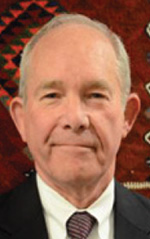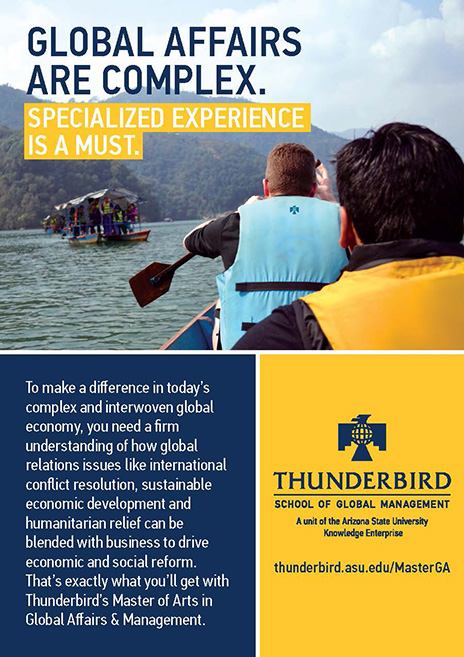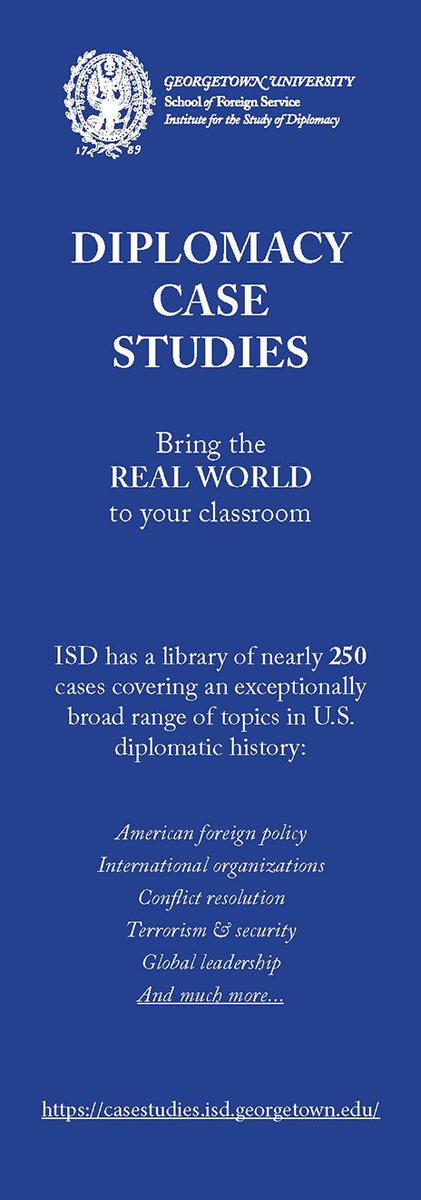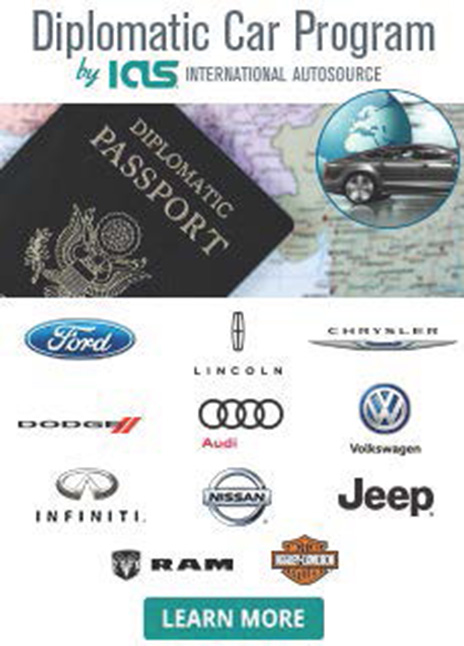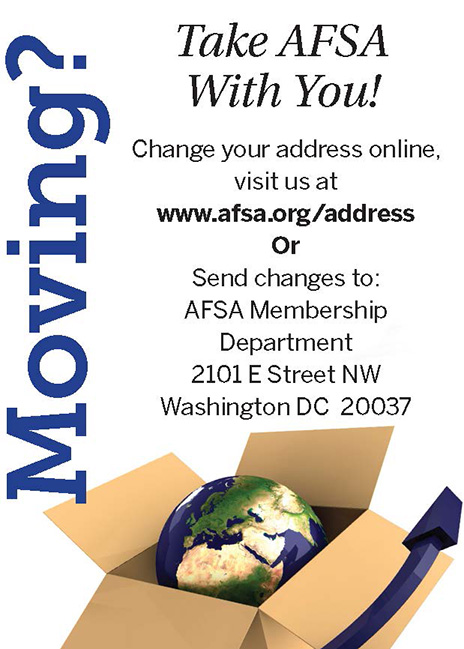It’s Practical: Training the Next Generation of Diplomats
Knowledge of history, area studies and current international affairs is not, by itself, sufficient to make an effective diplomat.
BY EDWARD “SKIP” GNEHM
A Roadmap for New Hires
By Stephen G. McFarland
- Keep learning about the host country.
- Meet and build relationships with host-country people.
- Know the mission of your embassy.
- Participate in the full range of embassy life.
- Shape your professional persona.
- Take the initiative in preparing work requirements.
- Start developing your own security awareness.
- If you see something, speak up.
- Balance work with family and personal needs.
- You will make mistakes. Acknowledge them.
Find out more in the July/August 2016 issue at afsa.org/fsj-archive.
The student stood up and posed this question: “Given the new administration’s severe cuts to the State Department’s budget, as well as the seeming intent to marginalize diplomacy, should I continue to pursue a career in international affairs in the government?”
I hear this question repeatedly from students keenly aspiring to join the U.S. Foreign Service or other U.S. agencies focused on international affairs. For me, budget cuts notwithstanding, there is but one answer: “There is always a need for effective diplomacy. There has never been a time when it was more important for you to pursue your dream to join the Foreign Service. America needs you and others like you.”
As I pondered that exchange over the next few days, however, the question consuming me was: What should I, and indeed my university, be doing to ensure that this aspiring student is well-trained and ready for the challenges of our profession? Are universities graduating students with the skills they need to succeed in the Foreign Service?
In reflecting on what it means to teach diplomacy, one comes to a stark conclusion: Knowledge of history, area studies and current international affairs is not, by itself, sufficient to make an effective diplomat. At its core, there is a combination of practical skills that define an effective diplomat, and these range from verbal and written communication to problem-solving and leadership. Integrating the full range of skills necessary for a successful career in diplomacy into university curricula is, therefore, a necessary albeit challenging endeavor.
Recently I headed a task force on “Practice” at The George Washington University's Elliott School of International Affairs mandated to do just that—to make recommendations on how best to integrate practical skills into students’ university experience. (The “Practice Task Force” was one of four set up by Dean Reuben E. Brigety to focus the Elliott School on STEP— Scholarship, Teaching, Ethics and Practice.)
For our students, we must first identify the skills that are most valuable in the diplomatic profession, and then seek out tangible ways to address them both in and out of the classroom. The goal is, ultimately, to produce well-qualified, competent individuals for careers in the dynamic and challenging arena of international diplomacy.
I present the highlights of our findings here.
Identifying Primary Practical Skills
The task force surveyed the attributes employers that hire international affairs students rated as very important, important or somewhat important. They fell into four major practical areas: (1) Leadership, Teamwork and Training (critical thinking, leadership and negotiating skills); (2) Policymaking and Policy Management (political analysis, formal briefing, development of policy options, media relations and risk analysis); (3) Analysis (quantitative analysis, long-term forecasting, case management analysis and financial statement analysis); and (4) Communication (writing skills, public speaking, foreign languages, use of online interactive social media, and cross-cultural communication).
Note the similarities to the professional attributes that are used to rate members of the Foreign Service for promotion and for assignment: leadership, intellectual skills, communication ability, interpersonal skills and management.
How then does one design a curriculum or syllabus that gives students the opportunity to develop these skills? One way is to have professors incorporate assignments and classroom engagement activities that reinforce these skills into their syllabi. In fact, the task force’s review of syllabi revealed that the majority of courses do this. Elements of critical thinking, writing, political analysis and developing policy options were the most prominent skills addressed. Leadership, risk analysis and public speaking were also prominent in course content.
For example, most professors already assign papers that require in-depth research and analysis. With instruction and guidance, professors can highlight the importance of critical thinking and policy options. What is less often tasked, however, is the drafting of shorter papers, akin to “action memos” in the State Department. Concise and succinct drafting with well-focused options and recommendations is a particularly valuable skill in government, as well as in the private sector.
Group Exercises and Scenarios
Group exercises develop interpersonal skills and the ability to work in a group setting. Success requires leadership and an ability to evaluate other views. It also requires discipline. In one of my classes, I divide students into eight working groups. Each group must prepare a presentation for the class on one country in the Persian Gulf. The groups have a finite amount of time during which they are to cover all aspects of that country’s domestic and foreign policy, as well as its relationship with the United States. It is a challenge and forces the group to be wellorganized, disciplined with their time and succinct.
Individual class presentations, if properly structured, enhance briefing skills—another important attribute that employers often find to be weak in applicants. Time-limited presentations on complex topics replicate the reality of the Foreign Service workplace. The ultimate accomplishment is enhanced student confidence in his or her ability to brief and to speak publicly.
Another important technique is the use of scenarios or crisis exercises. In my course on the role of an embassy in the conduct of foreign policy, I assign each student to a position on my country team. In the crisis scenario I feed the students data, which they report to the country team. As in real life, some of the information they receive is at variance with that from other sources. In some cases the source itself is questionable. The team must then analyze what they know and make assessments as to what they believe are the facts.
They then have to determine what recommendations they will make to Washington, and why. Inevitably there is much debate and, often, dispute—exactly as in real life. In this course, each student is paired with a Foreign Service officer who has served in the same capacity as the student’s role on my country team. The value of this additional ingredient is obvious. The students gain a practical understanding of their responsibilities and role in a crisis and, importantly, they develop a relationship with a real practitioner.
While this idea may seem a luxury available only at universities located in the Washington, D.C., area, there are, in fact, FS retirees around the country, as well as active-duty officers in Washington, who are able and willing to engage with students by phone or email, if not in person.
Special Skill Courses and Other Avenues
Department of State Opportunities for Students
U.S. Department of State Student Internship Program
Boren Awards for International Study—Boren Scholarship (undergrads) and Boren Fellowships (graduate students)
Thomas R. Pickering Foreign Affairs Fellowship and Graduate Foreign Affairs Scholarship
Virtual Student Foreign Service
Pathways Internship
Find out more in the July/August 2016 issue at afsa.org/fsj-archive.
Another effective way to enhance the development of these skills is through the design of special “skill” courses (one to three credit hours). These courses are tailored to give students practical exposure to specific skills demanded in their field and by the job market. Examples of such courses include public speaking, briefing techniques and dealing with the press and media. Skill courses can also focus on topics such as the role of the International Monetary Fund, development challenges in Africa, the politics of global oil, etc.
Such courses stress case management, long-term forecasting and financial analysis, among other things. The advantage of these courses is that they can be added to or deleted from the curriculum as events and interests change. They also enable students to seek training or experience in an area they assess as a personal weakness.
As the task force examined how students develop skills for their post-graduate occupations, it was evident that many of the skills that we had identified were, in fact, acquired outside the classroom. Specifically, engagement in student organizations gave students valuable experience in leadership roles, in developing and managing programs and in developing interpersonal skills. Internships are invaluable in exposing students to the workplace environment, giving them concrete experience working with others and establishing a work ethic of reliability, integrity and maturity.
Volunteerism also proves highly valuable in developing key skill sets such as understanding different cultures and navigating environments unlike the ones with which students are familiar. Civic engagement develops new perspectives and requires patience and understanding. Study abroad is yet another experience that proves significant in developing attributes valuable to the international field. Understanding other cultures, speaking foreign languages and coping with the unexpected are skills emphasized in the study abroad experience. Students today are arguably far more engaged in both volunteer work and study abroad than 15 to 20 years ago.
Faculty members play a key role in developing the skill sets students need to find employment in the international workplace. Professors who approach their jobs as academics contribute vitally to their students’ knowledge base, which students will use to make decisions and evaluate situations. When the United States agreed to reflag Kuwaiti tankers, I was one of the few civilians at the Department of Defense who understood the legal implications. My knowledge came from a grueling course in international law. Similarly, a course in international organizations gave me insight into the workings of the United Nations, which proved invaluable when I served in the U.S. Mission to the United Nations. The contributions made by the academic faculty remain incalculable and are in no way diminished as universities move to incorporate skill development into their curriculum.
Significantly, schools of international affairs now complement their faculty with professionals who have practical experience in their fields. Their role is even more important today, as schools focus on the practical skills needed in the foreign affairs profession. At GW today, for example, there are more practitioners on the faculty than in the past; but, more importantly, the traditional faculty today has a much better appreciation and acceptance of their importance and value.
These practitioners bring their real-life experiences—and an ability to relate theoretical analysis to reality—into the classroom. They place theory as well as historical facts into context, acknowledging the impact of individuals and personalities, domestic politics and competing national interests, etc. Yes, practitioners have stories to tell, but the stories are illustrative, in a demonstrable way, of the realities of the world in which we, as foreign affairs professionals, operate. Students remember stories and the critical lessons learned from those encounters.
How Well Is Academia Doing?
When we speak of teaching diplomacy, we must give due attention to developing the skill sets that make a diplomat effective. Universities are more attentive than in the past to the need to ensure that their graduates are prepared for the workplace—that when they strike out into the profession they have chosen, they have the skills that employers need.
While the “Practice Task Force” documented that faculty already incorporate in their syllabi many of the skills identified as vital to students interested in a diplomatic career; the task force noted that more needs to be done. It urged faculty be more focused on developing these skills. More specifically, the task force called for a requirement in the undergraduate curriculum that students take a set number of skill courses that target the skills that the task force had identified. That leadership in schools of international affairs is now focused on this core need is noteworthy. Re-engineering curriculum requirements and traditional faculty approaches in the classroom are challenges. Change is always a challenge.
So when students ask whether they should pursue a career in international affairs, we don’t just respond: “Yes, there has never been a time when it was more important for you to pursue your dream to join the Foreign Service.” We also say: “And we will give you the skills you need to serve America well.”

